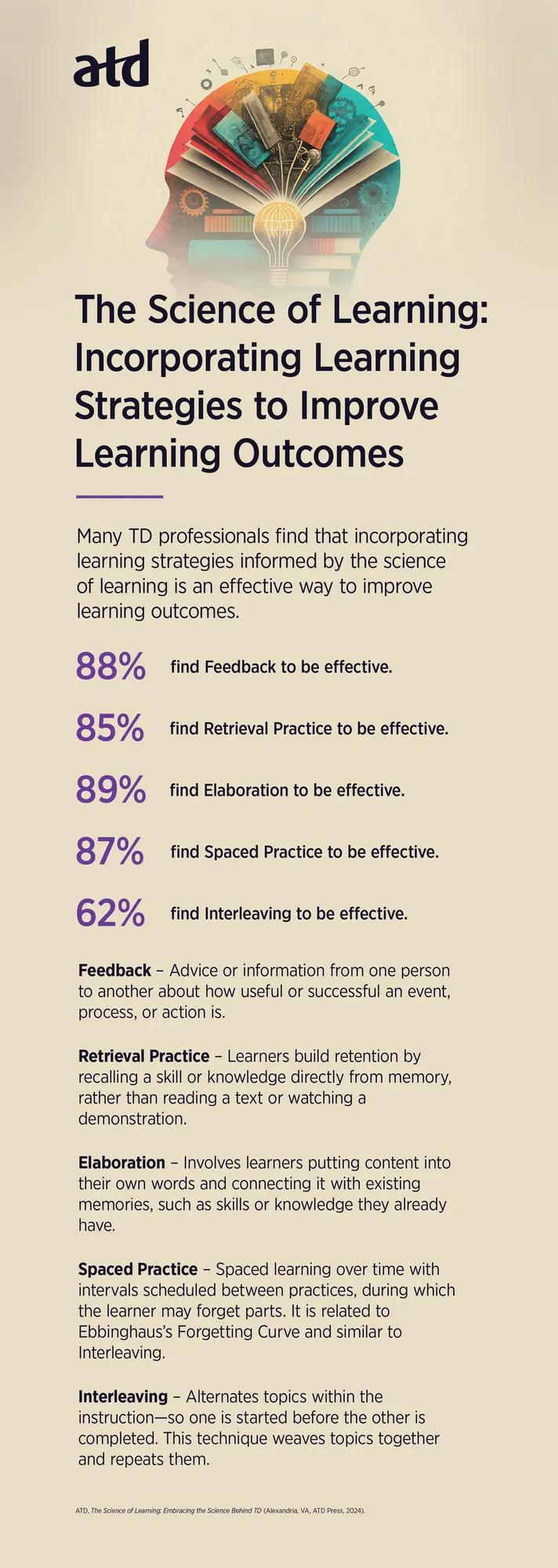ATD Blog
How Effective Are Learning Strategies in Improving Learning Outcomes?
The Science of Learning: Embracing the Science Behind TD asked TD professionals about their level of knowledge on the science of learning, how they apply it to their work, and how they develop their knowledge and skills in this area.
Tue Nov 26 2024

The science of learning is foundational to the field of talent development. In the TDBoK™ Guide: Talent Development Body of Knowledge, ATD defines the science of learning as an “interdisciplinary research-based field that works to further the understanding of learning, learning innovation, and instructional methodologies.” For those TD professionals who design and develop learning experiences, applying the scientific principles behind adult learning can help produce effective learning that sticks.
In October 2024, ATD published the research report, The Science of Learning: Embracing the Science Behind TD. For the study, 340 TD professionals answered questions about their level of knowledge on the science of learning, how they apply it to their work, and how they develop their knowledge and skills in this area. The report highlighted five key learning strategies that TD professionals can incorporate into their work to improve learning outcomes. Those learning strategies include feedback, retrieval practice, elaboration, spaced practice, and interleaving.
Most TD professionals found each of the five learning strategies to be effective in improving learning outcomes. However, the data suggested that they are not applying the strategies in accordance with how effective they find them. As an example, 87 percent of TD professionals said that spaced practice is effective in improving learning outcomes, but only 52 percent reported that they often or always incorporate spaced practice into learning design and delivery. Similarly, 89 percent of TD professionals said that elaboration is effective, but less—58 percent—reported that they often or always use this strategy.
In the April 2024 TD at Work guide “Principles for Brain-Friendly Learning,” author Dana Alan Koch shares some questions TD professionals can use to help determine the need to apply different learning strategies when creating learning experiences.
Feedback:
Do instructors provide helpful feedback to learners?
Are there enough Q&A sessions?
Retrieval Practice:
Are learners being asked to recall a skill or knowledge, instead of reading or watching a demonstration?
Are learners being assessed often enough?
Elaboration:
Do learners have the opportunity to put content into their own words?
Do practice activities help link new learning to existing knowledge?
Spaced Practice and Interleaving:
Do learners have too much crammed into a week or a day?
Are there opportunities for spaced practice outside of a learning event?
To learn more about how TD professionals apply the science of learning to their work, check out The Science of Learning: Embracing the Science Behind TD. It includes benchmarking data on the use of not only these various learning strategies, but also adult learning theories and other scientific concepts that can be leveraged in various TD roles.

You've Reached ATD Member-only Content
Become an ATD member to continue
Already a member?Sign In
